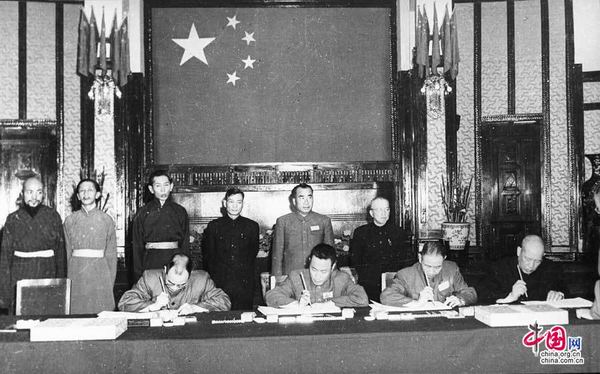
△ The plenipotentiary of the Central People’s Government and the plenipotentiary of the local government of Xizang held an agreement signing ceremony on the peaceful settlement of Xizang. Image source: CFP
Sixty-five years ago, on May 23rd, the Agreement between the Central People’s Government and the local government of Xizang on Measures for the Peaceful Liberation of Xizang was signed in Beijing. It marks the peaceful liberation of Xizang, and the social development of Xizang has turned a new page. May 23rd this year marks the 65th anniversary of the peaceful liberation of Xizang.
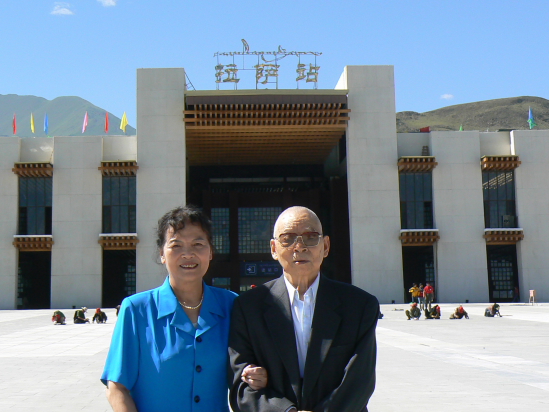
On this memorable day, Yin Fatang, the 95-year-old former first secretary of the Party Committee of Xizang Autonomous Region, and his wife Li Guozhu sent an email entitled "I wish people in Xizang more happiness" to Tibet, China. com to express their best wishes. Yin Fatang worked and lived in Xizang for 27 years and witnessed a series of important historical events about Xizang. The full text of the email is as follows:
I wish people in Xizang more happiness.
May 23rd this year marks the 65th anniversary of the signing of the agreement between the Central People’s Government and the local government of Xizang on the peaceful liberation of Xizang. Under the leadership of the CPC Central Committee, the people’s liberation army and the staff working in Tibet United with people in Xizang, the cruel feudal serfdom was abolished. The people have been completely emancipated and become masters. Brilliant achievements have been made in construction, and the people have lived a happy life since then.
As participants in the liberation and construction of Tibet, Yin Fatang and Li Guozhu are pleased to see the changes in Xizang today. Congratulations to Xizang for its faster development and happier people’s lives tomorrow. I wish the comrades who have worked hard for the revolutionary construction in Xizang a long and healthy life.
Yin Fatang, Li Guozhu.
Beijing on the morning of May 22, 2016
figure
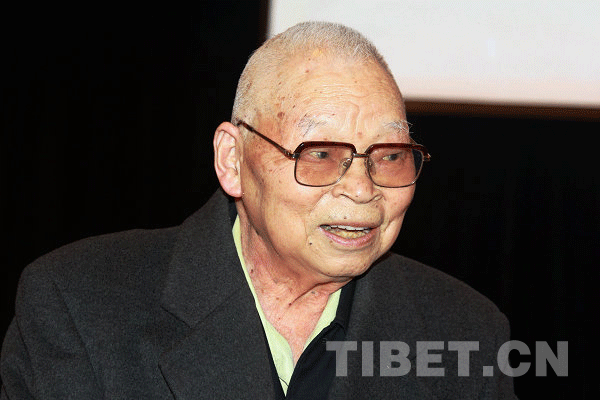
Yin Fatang, born in 1922, was born in Feicheng, Tai ‘an City, Shandong Province. He has successively served as political instructor and general branch secretary of the Sixth Team of the Eighth Route Army Shandong Column, deputy political commissar of the 52nd Division of the 18th Army of the Second Field Army of the People’s Liberation Army, director of the political departments of Xizang Military Region, Fuzhou Military Region and jinan military area command Military Region, deputy political commissar of jinan military area command and Chengdu Military Region, first secretary of the CPC Xizang Autonomous Region Party Committee and political commissar of the military region, and deputy political commissar of the Second Artillery Corps of the People’s Liberation Army. Worked in Xizang for 22 consecutive years. During his work in Xizang, he successfully resisted the infiltration and destruction of Xizang by ethnic separatist forces and extreme religious forces, safeguarded the social stability and national unity of Xizang, and defended the territorial integrity of the country.
Yin Fatang dictated Tibet’s past.
The arduous journey of the 18th Army into Tibet
The 60-year history of Xizang’s work can be simply divided into several periods: the first is to strive for the peaceful liberation of Xizang; The second is to sign an agreement and March peacefully to realize other parts of the 17-article agreement, and peaceful March is also one of them. At that time, it is most important to maintain and implement the agreement; The third period is counter-insurgency and reform, pacifying Xizang rebellion and democratic reform in Xizang; Fourth, reform and opening up. Xizang’s reform and opening up should be counted from 1980.
Let’s talk about the first period and strive for the peaceful liberation of Xizang. Xizang is a part of China, and the China People’s Liberation War has liberated other parts of the mainland, so Xizang is bound to be liberated. However, it is more difficult to liberate Xizang. Where is the difficulty? Needless to say, the climate, ice and snow, makes you cry in the middle of the night. Reach out and take the steel, and you can stick the skin down. Secondly, the traffic is inconvenient. Traffic is inconvenient, it is difficult for the army to move and the supply of supplies is very troublesome. It’s hard to fight if you don’t have enough to eat.
The other is ethnic and religious issues, especially in places controlled by religion, which are even more difficult. Therefore, we should not work blindly, but take it slowly, not like liberating other places. At that time, the Central Committee was very cautious. On October 13th, 1949, the Central Committee handed over the task of liberating Xizang to the Second Field Army, which was the Southwest Military Region. The Second Field Army liberated Yunnan, Guizhou, Sichuan, Kangzang, and these areas were all liberated at the latest, with the northwest liberated early and the southwest liberated late. Chairman Mao originally intended to let Yiye undertake (the task of liberating the southwest). Later, after Peng Dehuai’s investigation, he found it very difficult, and it took two years to prepare for it. So Chairman Mao decided that since it was difficult for the northwest (field army) to enter Tibet, it was still the southwest (field army) to enter Tibet. On January 2, 1950, it was officially decided to enter Tibet from the southwest (field army), mainly the 18 th Army.
The entry into Tibet is confirmed, so how can Xizang be liberated? At that time, I wanted to use peaceful means, that is, to find a way to send people to Xizang to make peace. At that time, I took several routes. One was that the central government did the work directly, and at that time it was the Ministry of Foreign Affairs. At that time, the Indian embassy was built in Beijing, and we went to do their work. The Indian embassy directly talks with the delegation of Xizang. Troops do their work directly in the process of advancing, which is the second kind. The third way is to send people to Lhasa, four times in total. Twice from Qinghai and twice from Xikang. Not only did they not come to talk, but they also trained troops, bought weapons, dispatched troops, and transferred troops to Jinsha River to stop the PLA. We can’t stand it, and there is no way to solve it peacefully. Therefore, we had to make peace by war and make progress by war, so we carried out the battle of Qamdo.
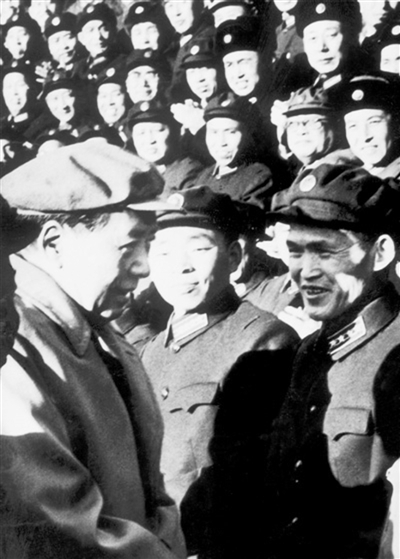
△ In the early 1950s, President Mao Zedong cordially received officers and men who participated in the task of liberating Xizang, the border of the motherland. Yin Fatang (middle) was then the deputy political commissar of the 52nd Division of the China People’s Liberation Army.
"Bodhisattva Soldiers" sent by Chairman Mao
Some people ask, you haven’t carried out reforms in Xizang for eight years. What are you doing? There are many things. The agreement is a program and must be carried out. Specific work, one is the United front work, the upper United front, especially the Dalai Lama. Anti-imperialist and patriotic United front, uniting against imperialism, which is the main enemy and the enemy of people in Xizang, is a big task. The second is to influence mass work. Why is it called "influencing mass work"? General mass work is mainly to mobilize the masses, organize the masses, and inspire and educate the masses. At that time, Xizang was mainly against imperialism, not feudalism. We brought the movie "White-haired Girl", but we didn’t put it on. Let go, and everyone will arrest Huang Shiren. How can this be done? For the time being, we will not carry out class education, let alone class struggle. We give alms to lamas and nuns, see doctors for free, run schools, provide disaster relief, build roads, and lend agricultural loans so that serfs can have seeds to go to the fields. At first, it was all free, and later it was very low interest. In fact, at that time, the big work still had to go through the upper level, and the upper level had to agree first. They couldn’t do it if they didn’t agree. Some serfs got agricultural loans during the day and sent them to serf owners at night, but they didn’t wake up and were still under the control of others. However, it slowly changed.
After our 52nd Division entered the east of Lhasa, Chen Zizhi, my deputy teacher, and I led a delegation to the southeast of Lhasa, along the banks of Niyang River and Yarlung Zangbo River, to inquire about the customs, observe the people’s feelings, conduct investigation and study, carry out United front work, publicize the party’s policies and the 17-article agreement, and strengthen ties with the masses. But the masses ran away as soon as they heard that the troops were coming, because they didn’t know what was going on with communist party and the People’s Liberation Army. Although they ran away, our cultural and art team still put on makeup seriously and performed the program with gongs and drums. After a while, a few courageous people came first, stood around watching the program, and found that the PLA was not like "communist party eats children, has yellow hair and green eyes, and is like a ghost" as advertised by the reactionary government in Xizang, but treats people very close, so they dismissed their concerns. In this way, the masses came back slowly. So, we seized this opportunity to visit Zongben (county magistrate), nobles and leaders, visit the people’s homes, treat them and help them do things, and soon became one with the Tibetan people and made good relations. In this way, we walked nine Zongxi, that is, nine counties. Through these efforts, the Tibetan people have learned about communist party and the People’s Liberation Army, and their attitude towards us has gradually changed: from being afraid to not being afraid, from being deeply estranged from the Han people to gradually eliminating the estrangement, from discriminating against the Han people and treating them differently to being called "Imakiayahito", and most upper and middle-level people have actively supported the troops. Finally, they think that the People’s Liberation Army is a relative and a "Bodhisattva soldier" sent by Chairman Mao.
It is the fruitful work of our Party and army that has enabled serfs, slaves and other poor farmers and herdsmen who have been oppressed and exploited to have their own land, livestock and other property, and to have their own equal political rights. They have jointly embarked on the bright road of socialism and opened a new chapter in Xizang’s social development. Up to now, the old people in Xizang still miss the 18th Army in particular, and have deep feelings for the officers and men of the 18th Army.
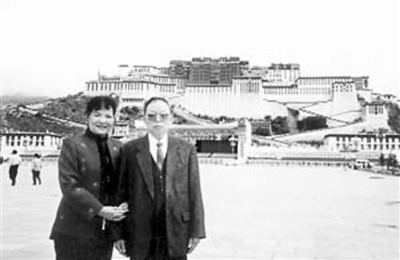
Knowing Tibetan, the masses really treat you as a relative.
In 1982, I published an article in China Youth Daily entitled "Welcome young people with aspirations to come to Xizang". Many college students, junior college students and even those who have already joined the work came to work in Xizang, and some of them still stayed in Xizang. But this method is still not enough, so we transferred talents from the mainland. When I was the first secretary, there were already 3000 or 4000 college students in Xizang, and some of them are now the party secretary.
Aid cadres in Tibet have brought a lot of new knowledge and ideas to Xizang. In addition, they can play the role of bridge-building. For example, Shigatse in Xizang is aided by Shanghai and Shandong provinces, and aiding cadres plays the role of bridge-building.
But there is also a problem, that is, in the minds of cadres who aid Tibet, they will think that we are here to help you. In the past, cadres who built Tibet for a long time held the idea of joint construction. Of course, there are many cadres who have good ideas and are willing to bear hardships, and want to make greater contributions to Xizang in three or five years. In fact, you can see the difference from speaking Tibetan. Learning Tibetan used to be a compulsory course, but now there are very few Tibetan aid cadres who specialize in learning Tibetan. Because the Tibetan aid cadres have only been in Tibet for three years, and most Tibetan cadres in the government can speak Chinese, many Tibetan aid cadres feel that there is nothing wrong with not learning. If you know Tibetan, it will be different, so that the masses will treat you more as relatives and will tell you the truth.
At the beginning, the cadres who built Tibet had a lot of worries, such as how to settle down when they came back, and the education and work of their children. Many of the first cadres who built Tibet have had a hard time. Now, Tibetan aid cadres basically won’t have these troubles, and everything has been arranged for you. Therefore, it is hoped that Tibetan aid cadres in the new period will carry forward the "old Xizang spirit" and overcome more difficulties compared with their predecessors. (Tibet, China Net Comprehensive/Li Liu Li Yanxing)